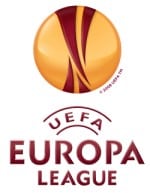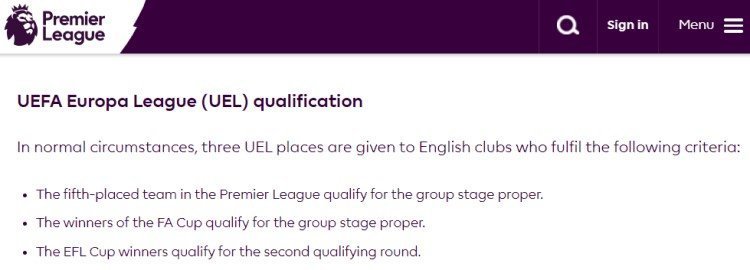
Presidential Debate Causes Biden Odds To Shorten
American voters who viewed last night’s debate between Donald Trump and Joe Biden were left shaking their heads with dismay at the ill-tempered and bitter…
 The UEFA Europa League is one of the most watched and highly prestigious club competitions in the world. Second only to the Champions League, these days it features some of the biggest clubs on the continent and as a result, some of the world’s best players.
The UEFA Europa League is one of the most watched and highly prestigious club competitions in the world. Second only to the Champions League, these days it features some of the biggest clubs on the continent and as a result, some of the world’s best players.
Betting on the Europa League has therefore become extremely popular with punters in the UK and around Europe as well. The group stages can often see some shock results, especially when the bigger teams get complacent and underestimate their opponents. But in the knock out stages, managers start to take it a lot more seriously when they realise that they are only a few wins away from reaching a major final.
Today we’re delighted to bring you some betting offers to use on the Europa League. We’ve selected some great free bets for new customers, brought to you by some of the bookies who also offer the best odds on European football.
| Bookmaker | Details | Claim |
|---|---|---|
 | Open Account Offer *Open Account Offer Bet £10 & Get £50 in Free Bets for new customers at bet365. Min deposit requirement. Free Bets are paid as Bet Credits and are available for use upon settlement of bets to value of qualifying deposit. Min odds, bet and payment method exclusions apply. Returns exclude Bet Credits stake. Time limits and T&Cs apply. #ad | Claim |
 | Money Back on Loss up to £20 New customers only, limited to one per person. If you’ve previously had a Paddy Power account, you will not qualify for the offer. Place your FIRST bet on any Sportsbook market and if it loses we will refund your stake in CASH. Max refund for this offer is €/£20. Only deposits made using Cards or PayPal will qualify for this promotion. T&Cs apply. 18+|Gamble Aware. | Claim |
 | Bet £10, Get £30 (Promo Code H30) 18+. Play safe. New customers using Promo code H30 only, Min £10/€10 stake, min odds 1/2, free bets paid as 2 x £15/€15, free bets credited after settlement of first qualifying bet, free bets will expire 30 days after the qualifying bet is placed, payment method/player/country restrictions apply. | Claim |
These are some of the best new customer betting offers available at the moment, but if you happen to already have accounts at these sites then you can click the button above to see the full list. You’re sure to find plenty of bonuses there that you haven’t already claimed.
Most people really start to take an interest in the Europa League when it gets to the knock out stages. But many of the teams have already gone through a lot to get that far. It’s an epic journey and any club that wins the trophy will have had to work hard for their title. Here’s how the format of the competition works, from qualification all the way through to the final.
Since the emergence of the Europa League back in the 2009/10 season there have been various changes into how teams qualify for this tournament. Especially with there being more and more teams being able to qualify for the qualification stage.
Like the Champions League, teams from UEFA’s higher rankings leagues can enter the competition in the more favourable and latter rounds of the competition. Overall though, each nation has three teams able to qualify for the competition except for just a few who currently only have one or two places available.

At the last count there was fifty five nations ranked and as you can imagine this has increased significantly over the past decade or so, as well as when the competition was just known as the UEFA Cup.
For the most part each country has teams that qualify from the various runner-up places in the that countries top league, along with the winners of each nations main cup competition. In the higher ranking leagues runners-up places do qualify for the UEFA Champions League, so if illegible to enter that then runner-up spots can be from further down the league table like in Germany, Spain, Italy and England.
A couple of countries do also have secondary cup competitions, like the League Cup in England, but currently only the winners of that competition and a similar one in France are granted places.
Once all the Champions League spots are taken by the qualifying nations, then the Europa League places are granted to the remaining qualified teams from each nation. However, if a team has already qualified through their respective league success and they have success in their cup competition, then the extra place is passed onto the highest placed league behind them, not the runners up in the cup competition.
Similarly if the both the Champions League and Europa League champions from the previous year didn’t qualify via their domestic league or cup performance, then they would replace the lowest ranking Champions League placed team in their league and they would move to the Europa League.
Finally, once all this has been decided then the teams can start to play their qualifying matches to then ultimately reach the group stages of the competition. Again, depending on a nation’s UEFA ranking, team will enter at various stages beginning with the Preliminary Round, through to the First, Second and Third Round qualifying before a final Play-Off Round.
These fixtures are typically played from late June, throughout July and into August. For the Play-Off Round, all the qualified teams are also joined by some teams that have been knocked out of the latter stages of the Champions League qualification process.
More recently, clubs that are knocked out of both the qualifying round and the group stages of the Champions League can also join the UEFA Europa League at different stages of the competition.
Similarly to the Champions League, there have been various ideas suggested and again implemented over the years for the Europa League group stages. For now though the forty eight qualified teams go into twelve groups of four and these home and away fixtures are then played between September and December.
The teams that go into each group are decided by four lots of seeding, with twelve teams being seeded as pot 1, twelve as pot 2 and so on. Which means each group will then contain 1 team from each of the pots with pot 1 being the highest seeded teams. Like the Champions League Group Stages, teams from the same country cannot be drawn into the same group.
It’s the standard three points for a win and one for a draw in the groups and once all group fixtures are completed home and away, the top two from each group progress to the Knock-Out stage. If for any reason there are teams on the same amount of points at the end, then it is firstly decided on goal difference, then by their head-to-head results.
Once this has all been decided, the twenty four qualified teams are then joined by eight teams that have been knocked out of their Champions League groups after finishing third. This next stage is know as the Round of 32 Knock-Out Stage.
Once the Group Stages are complete, the Round of 16 Knock-Out stage draw takes place. However, once the draw is made, the Europa League does take a break for two months before starting up again in mid to late February.
Like the Group Stages, the Knock-Out draw also has stipulations too, with the twelve group winners and the four best placed teams entering from the Champions League group known as the seeded teams. Then the twelve group runners-up along with the other four teams from the Champions League as the unseeded teams.
Teams from the same group or country cannot be drawn against each other at this stage, but each seeded team will be drawn against an unseeded team, with the unseeded teams hosting the first-leg.
The teams again play each other both home and away and away goals count at this stage too, which means if a match is drawn over two legs the team with the most away goals will go through. If the teams cannot be separated by away goals and all things are still level, then the match will progress to extra-time and then penalties until there is a winner.
From here on in though, from the Round of 16 to the Quarter-Finals and Semi-Finals there are no restrictions on who could face whom. The matches come thick and fast at theses stages and are usually played around March, April and at the very beginning of May.
The two remaining teams will then play the European League Final on a Wednesday night at the end of May. With the venue for the Final normally chosen a couple of years in advance from the applicants that apply to host the event.
So that’s the modern format, but how did we get to that stage? Let’s look at the history of the various European competitions that eventually combined to create the Europa League.
A lot of people believe the UEFA Cup started in the early eighties and to a certain point they are correct. However, the emergence and the beginning of the tournament started way back in the mid-fifties at the same time as the European Cup. Back then though it was known as the Inter-Cities Fairs Cup and that officially ran from 1955 through to 1971.
The Inter-Cities Fairs Cup, which was also known by some as the Fairs Cup, the Fairs Cities’ Cup or even the European Fairs Cup grew from strength to strength once it got started. With more and more teams meeting each other in ‘friendlies’ across Europe thanks to various cities holding trade fairs which allowed games to be played.
With the more and more games that were being played, UEFA proposed they take it over in 1971 and only then did it officially become a major tournament in UEFA’s eyes. FIFA does view the Inter-Cities Fairs Cup competition as a major honour but UEFA doesn’t and therefore has never listed the winners of it in their statistics as there was no real qualification to the tournament.
Once UEFA took charge of the competition and renamed it, football clubs were able to qualify for the competition based on their performance in their national leagues and cup competitions. National League winners would of course go into the European Cup (now Champions League) back then, but runners up etc would get the chance to play in a second-tier competition of European club football.
The UEFA Cup was dominated by English teams to begin with Spurs beating Wolves in the first ever final and the following year Liverpool beat German side Borussia Mönchengladbach. Borussia would reach three more finals in the seventies, winning two and losing the other. Both Spurs and Liverpool would reach other finals in the seventies as well, unfortunately Spurs lost to Dutch outfit Feyenoord, whilst Liverpool beat Club Brugge.
Other teams that won it in the seventies were big names like Juventus and PSV Eindhoven, but then at the start of the 1980’s there were wins for the likes of Ipswich Town, Anderlecht and IFK Göteborg. Along with Real Madrid, IFK Göteborg were the only sides that actually won the UEFA Cup twice throughout the eighties.
Belgium side Anderlecht did reach two finals themselves, however in 1984 they lost to a Tottenham Hotspur side that would become just the third team at the time to win the UEFA Cup twice. Madrid themselves made that four teams with back to back victorious the following years though.
In 1985 all English clubs served a five-year-ban from the competition following the Heysel disaster, which saw 39 people killed in the stands when a wall collapsed after trouble broke out between both Liverpool and Juventus fans in the European Cup Final. Liverpool themselves were excluded for six years in total.
During this time and through until 1992 there was seven different winners of the competition which included first-time winners like Bayer Leverkusen, Napoli, Inter Milan and Ajax. Juventus then won the competition for a third time in 1993 and Inter Milan won their second the following year.
The nineties finals were dominated by the Italians, with only the 1996 final between winners Bayern Munich and Bordeaux not featuring a side from Italy. Parma won it 1995 in a third all-Italian final when they beat Juventus 2-1 over two legs. A win for Schalke came in 1997 before Inter Milan won it for a third time and Parma a second in total in that decade.
Towards the end of the nineties there was also some changes made to the the tournament with the scrapping of a final being played over two-legs as UEFA looked to hold more prestige finals in neutral grounds for the competition. The first being Inter’s 3-0 win over Lazio in 1998 which was played in the Parc des Princes in Paris.
In 1999, both the UEFA Champions League and UEFA Cup were getting bigger and bigger with more of the big names playing in it, unlike UEFA’s Cup Winners’ Cup competition which was on the decline and subseqently disbanded to merge as one into the UEFA Cup.
In 2000 the final contained an English side for the first time since 1984, however Arsenal could only draw with Turkish side Galatasary before losing 4-1 on penalties. The following year though did see English side Liverpool win the competition for the third time when they beat Deportivo Alavés 5-4 in a unbelievable game that was decided by a golden goal.
Wins followed for Feyenoord, Porto, Valencia and CSKA Moscow but Spanish side Sevilla came on the scene to start a string of success in the competition. Since their first appearance in a final in 2006, they have gone on to win all four more of their appearances in finals in 2007, 2014, 2015 and 2016.
CSKA Moscow’s win in 2005 was followed up in 2008 when fellow Russian side Zenit Saint Petersburg beat Rangers at The City of Manchester Stadium. This was then followed up a year later with Ukraine’s Shakhtar Donetsk team beating Werder Bremen in Istanbul in the last ever names UEFA Cup Final.
In the 2009–10 season, the competition was renamed and re-branded as the UEFA Europa League in a bid to increase the competition’s profile. More teams were able to qualify which meant the competition could now have a group stage consisting of twelve groups of four teams.
English side Fulham found themselves in the first ever Europa League Final but they were beaten 2-1 by Atletico Madrid. It was Atletico’s first appearance in a final and they have been in two more since in 2012 and 2018 winning both. Portuguese side Porto then won it for a second time in 2011.
That was followed by Chelsea winning it Amsterdam against Benfica the following year to become the first Champions League holders to win the UEFA Cup/Europa League the following year. Then it was Seville dominance with three back to back wins with two different managers before Manchester United beat Ajax in 2017 and then Atletico Madrid beat Marseille in 2018.
But who will win this year? Check out the latest odds then make your predictions….